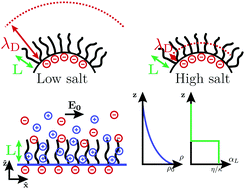Rapid characterization of neutral polymer brush with a conventional zetameter and a variable pinch of salt
Abstract
The fundamental and practical importance of particle stabilization has motivated various characterization methods for studying polymer brushes on particle surfaces. In this work, we show how one can perform sensitive measurements of neutral polymer coating on colloidal particles using a commercial zetameter and salt solutions. By systematically varying the Debye length, we study the mobility of the polymer-coated particles in an applied electric field and show that the electrophoretic mobility of polymer-coated particles normalized by the mobility of non-coated particles is entirely controlled by the polymer brush and independent of the native surface charge, here controlled with pH, or the surface–ion interaction. Our result is rationalized with a simple hydrodynamic model, allowing for the estimation of characteristics of the polymer coating: the brush length L, and the Brinkman length ξ, determined by its resistance to flows. We demonstrate that the Debye layer provides a convenient and faithful probe to the characterization of polymer coatings on particles. Because the method simply relies on a conventional zetameter, it is widely accessible and offers a practical tool to rapidly probe neutral polymer brushes, an asset in the development and utilization of polymer-coated colloidal particles.



 Please wait while we load your content...
Please wait while we load your content...